

- People with severe mental illness are at higher risk for COVID-19, but are unlikely to be prioritized when receiving the coronavirus vaccine.
- People diagnosed with attention deficit / hyperactivity disorder, bipolar disorder, major depressive disorder or schizophrenia are much more likely to contract the new coronavirus than people without a serious mental illness.
- Experts say these groups should be prioritized with a COVID-19 vaccine.
People with serious mental illnesses such as schizophrenia and major depressive disorder have a higher risk of contracting the new coronavirus and dying from COVID-19.
Still, in most countries, this at-risk population is not a priority when receiving the COVID-19 vaccine.
“Society must give priority to groups at risk, but it is discouraging to see that even during the pandemic, mental health is an afterthought – if it is – for many countries,” said Hilkka Kärkkäinen, president of the Global Alliance of Mental Illness. Advocacy Networks Europe (GAMIAN-Europe), said in a press release.
“The scientific evidence is clear that COVID, and the resulting lockdown, causes significant harm to people with severe mental health problems, but very few countries are addressing this. This has to change. “
In a new study, Kärkkäinen and her colleagues looked at 20 European countries to see how they prioritized high-risk groups for COVID-19 vaccination.
They found that only Denmark, Germany, the Netherlands and the United Kingdom recognized serious mental illness as a high-risk medical condition that could make people vaccinated earlier.
Their results were published in the journal Feb. 17
It’s a grim statistic reflected by the United States.
Only a few states, such as New Jersey and Ohio, include people with severe mental illness in the early stages of the COVID-19 vaccination rollout. And these were limited to inpatients in psychiatric hospitals.
While a lot
Recent research shows that people diagnosed with attention deficit / hyperactivity disorder, bipolar disorder, major depressive disorder, or schizophrenia are much more likely to contract the new coronavirus than people without serious mental illness.
Researchers believe this is because people with severe mental illness are more likely to work in unsafe environments, live in crowded groups, or be homeless – all factors that increase their chances of getting the virus.
Severe mental illness also increases the risk of dying from COVID-19.
a
A more recent study in
The study authors wrote that people with schizophrenia may have differences in their immune systems that predispose them to severe COVID-19.
Or the drugs used to treat schizophrenia can make COVID-19 worse.
Additional research would be needed to determine whether these factors played a role in patient outcomes.
Dr. Benjamin Druss, a professor and Rosalynn Carter chair in mental health at the Rollins School of Public Health at Emory University in Georgia, says the New York City study suggests that serious mental illness may increase a person’s risk in addition to that other factors.
“People with severe mental illness are definitely at high risk [for COVID-19] as a result of co-morbidity, ”he said,“ and they may be at an even greater risk over and above that co-morbidity, as suggested in that article. “
But there are other reasons for making this group a priority for the COVID-19 vaccine.
“People with severe mental illness are also at risk of not getting the vaccine, even if they qualify,” said Druss. He says this is due to “a variety of reasons,” such as higher homelessness rates and the lack of regular sources of primary care medical care.
He believes that designating this group as a high-risk population should go hand in hand with assigning vaccine doses to facilities where people with severe mental illness receive services or health care, such as group homes, homeless shelters, community mental health centers and psychiatric institutions. hospitals.
If a single-dose vaccine is approved, it could help reach this population as people who receive care or services in these places may not return for a second dose.
“With the Johnson & Johnson vaccine on the horizon, requiring only a single dose, it makes even more sense to expand the number of places where the vaccines are offered to include different types of public mental health services,” he said.
While most states don’t prioritize people with serious mental illness for the COVID-19 vaccine, people may fall into a different priority tier based on their age or other medical conditions.
To find out if you or someone else in your state is eligible for the COVID-19 vaccine, contact your state or local health department.